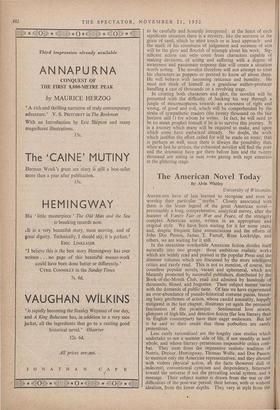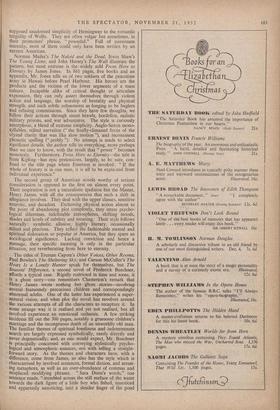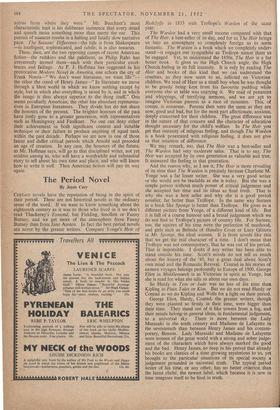The American Novel Today
By Alvin Whitley
University of Wisconsin.
AMERICANS have of late learned to recognise and even to worship their particular "myths." Closely associated with them is the lesser legend of the great American novel— presumably a long, comprehensive, analytical survey, after the manner of Vanity Fair or War and Peace, of the strangely complex American scene, written in an appropriate and original style. We have been waiting for it for some years, and, despite frequent false annunciations and the efforts of John Dos Passos, James T. Farrell, Ross Lockricige, and others, we are waiting for it still.
In the meantime worthwhile American fiction divides itself naturally into two groups: those ambitious realistic works which are widely read and praised in the popular Press and the slimmer volumes which, are discussed by the more intelligent critics and rarely read. This is not to mention, of course, the countless popular novels, vacant and ephemeral, which are blatantly promoted by successful publishers, distributed by the Book-of-the-Month Club, read and admired by hundreds of thousands, filmed, and forgotten. Their subject matter varies with the demands of public taste. Of late we have experienced an over-abundance of pseudo-historical costume pieces, featur- ing lusty gentlemen of action, whose candid amorality, happily mitigated in the last chapter, illustrates yet again the perennial fascination of the picaresque. Sentimental love stories, glimpses of high life, and detective fiction (far less literary than its English counterpart) have their eager audiences. But let it be said to their credit that these potboilers are rarely pretentious.
Less easily rationalised are the lengthy case studies which undertake to see a seamier side of life, if not steadily at least whole, and whose literary pretensions responsible critics com- bat. They stem from the impressive realistic tradition of Norris, Dreiser, Hemingway, Thomas Wolfe, and Dos Passos, to mention only the American representatives; and they abound with violent physical action, all the facts (however dull or indecent), conventional cynicism and despondency, bitterness toward the universe if not the prevailing social system, and a message. Their subject matter is drawn from the war or the difficulties of the post-war period; their heroes, with or without idealism, from the lower depths. They vary in style from the supposed unadorned simplicity of Hemingway to the romantic turgidity of Wolfe. They are often vulgar but sometimes, in their promoters' phrase, " powerful." Full of passionate intensity, most of them could only have been written by an earnest American.
Norman Mailer's The Naked and the Dead, Irwin Shaw's The Young Lions, and John Hersey's The Wall illustrate the pattern, but most extreme is the widely sold From Here to Eternity by James Jones. In 861 pages, five books and an appendix, Mr. Jones tells us of two soldiers of the peacetime army in Hawaii before Pearl Harbour. His heroes are the products and the victims of the lower segments of a mass culture. Incapable alike of critical thought or articulate expression, they can only assert themselves through violent action and language, the worship of brutality and physical strength, and such subtle refinements as longing to be buglers and refusing commissions. Since they have few thoughts, we follow their actions through street brawls, bordellos, sadistic military prisons, and war adventures. The style is curiously amorphous, a blend of extreme simplicity. Anglo-Saxon mono- syllables, stilted narration (" the finally-climaxed focus of the crystal clarity that was like slow motion "), and inconsistent phonetic spelling (" probly "). No attempt is made to select significant details; the author tells us everything, more perhaps than we care to know, with the result that " power " becomes monotony. Furthermore, From Here. to Eternity—the title is from Kipling—has epic pretensions, largely, to be sure, con- fined to the title page where Emerson is invoked: " If the whole of history is in one man, it is all to be explained from individual experience."
The second group of American novels worthy of serious consideration is opposed to the first on almost every point. Their inspiration is not a naturalistic qaditibn but the Master, Henry James. with all the consequences that such a shift in allegiance involves. They deal with the upper classes, sensitive neurotic, and decadent. Eschewing physical action almost to the point of abandoning plot completely, they stress psycho- logical dilemmas, indefinable atmospheres, shifting moods, shades and levels of subtlety and meaning. Their style follows naturally : symbolic, allusive, highly literary, occasionally stilted and precious. They reflect the fashionable mental and spiritual dislocation so popular in America, but they spare us sociological significance. Lacking conviction and hence a message, their specific meaning is only in the particular situation, not reverberating from here to eternity.
The titles. of Truman Capote's Other Voices, Other Rooms, Paul Bowles's The Sheltering Sky, and Carson McCuller's The Heart Is a Lonely Hunter speak for themselves, but The SeasonS' Difference, a second novel of Frederick Buechner, affords a typical case. Rigidly restricted in time and scene, it is a ghost story—one remembers Chesterton's remark that Henry James wrote nothing but ghost stories—involving several fearsomely precocious children and correspondingly abnormal adults. One of the latter has experienced a super- natural vision, and what plot the novel has revolves around the various attempts of all .the characters to recapture it., In some strange way it is realised . and yet not realised, but all involved experience. an emotional catharsis. A few striking incidents fill out the 300 pages, notably a gruesome children's marriage and the incongruous death of an unworldly old man. The familiar themes. of spiritual loneliness and indeterminate search are largely expressed symbolically, rarely directly and never dogmatically; and, as one would expect, Mr. Buechner is principally concerned with conveying stylistically psycho- logical and atmospheric nuances, not with telling a straight- forward story. As the themes and characters have, with a difference, come from James, so also has the style which is characterised by involved sentences, formal diction, and arrest- ing metaphors, as well as an over-abundance of commas and misplaced modifying phrases. " Sara Dunn's words," one sentence reads, " trembled across the still surface of the water towards the dark figure of a little boy who fished, unnoticed and apparently unnoticing, intO a slender finger of the pond across from where they Were." Mr. Buechner's most characteristic trait is his deliberate insistence that every detail and speech mean something more than meets the ear. This pursuit of nuances results in a halting and fatally slow narrative pace. The Seasons' Difference—the title is from Shakespeare —is intelligent, sophisticated, and subtle; it is also tenuous.
These, then, are the two opposing camps of recent American fiction—the redskins and the palefaces, as Philip Rahv has irreverently termed them—each with their particular excel- lences and failings. As F. J. Hoffman has suggested in his provocative Modern Novel in America, one echoes the cry of Frank Norris—" We don't want literature, we Want life "- the other the creed of Henry James—" In literature we move through a blest world in which we know nothing except by style, but in which also everything is saved by it, and in which the image is thus always superior to the thing itself." One seems peculiarly American; the other has abundant representa- tives in European literatures. They divide but do not share the honours of the present. The brighter honours of the past have justly gone to a greater generation, with representatives such as Hemingway and Faulkner. No one can deny either their achievement in both significant content and suitable technique or their failure to produce anything of equal rank within the past decade. Perhaps we are now in one of those latent and duller critical periods which Arnold said preceded an age of creation. In any case, the honours of the future, as Mr. Hoffman says, will go to that disciplined writer, not yet evident among us, who will have a worthwhile and substantial story to tell about his own time and place, and who will know how to write it well. Then American fiction will pay its way again.












































































 Previous page
Previous page